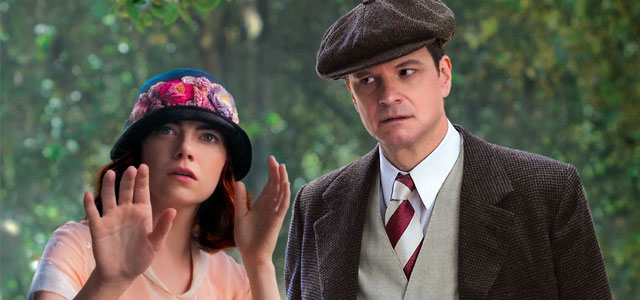(M) Emma Stone, Colin Firth
“What has been will be again, what has been done will be done again; there is nothing new under the sun.” – King Solomon
When it comes to sceptics about the spiritual realm, no one in cinematic history compares to Stanley Crawford (Colin Firth). A professional magician in the 1920’s, Crawford is an arrogant prima donna. In his spare time, he enjoys debunking mystics, spiritualists and anyone who tries to imply that there is an afterlife. When he is presented with a challenge from a friend and fellow magician, Howard Barken (Simon McBurney), to come and expose a beautiful, spiritualist who is apparently swindling a rich American family in the south of France he reluctantly agrees.
Emma Stone (The Help, The Amazing Spiderman) plays the gifted mystic, Sophie. She has worked to gain the confidence of the family and eventually manages to convince Stanley that her abilities are legitimate.
As the story develops through multiple attempts to expose Sophie as a fraud, a unique love triangle develops between the young spiritualist, Stanley and Brice (Hamish Linklater), the heir apparent to the Pittsburgh coal fortune. Confusion begins to add spice to this little triangle and Stanley becomes fascinated by Sophie’s abilities and finds with a new revelation of the afterlife, and begins to allow himself to leave behind his scepticism and begins to love life. Sophie becomes infatuated with Stanley, even though he does not have any romantic feelings for her.
The tour de force of the film is Eileen Atkins, as Aunt Vanessa. Atkins brings a lighter and enjoyable side to this film. She is the perfect foil to Firth’s character. Their relationship is the most endearing part of the film. She brings out the lighter moments in the story and is the catalyst for the conclusion of the film. In true Woody Allen fashion, this twisted tale spins out of control and their lives, feelings, and motives come together to a light hearted, if not predictable ending.
Due to his cinematic reputation, Allen manages to get some of the greatest talents in the business to come and work with him. Firth and Stone are joined by an excellent supporting cast of Eileen Atkins, Marcia Gay Harden and Jacki Weaver. Besides the Atkins/Firth relationship, the acting credentials are there, but not supported by good writing. The dialogue and relationships lacked congruency or depth. In most of the recent Allen films, the male lead is written as if Woody is in the lead role, but played by someone else.
The dialogue tends to be rambling and awkward, which works for Allen and worked wonderfully for Owen Wilson in Midnight in Paris, but does not work well for Firth. The saving grace of the film is the beauty of Southern France. This backdrop gives the film the needed lift from some of the challenging dialogue. The arguments about scepticism for the spiritual realm are unoriginal, even though Allen is consistent in striving to debunk all things spiritual. These debates are weak and attempts to equate all things spiritual and religious together, inevitably leaves the discussion muddled.
The key component that Allen seems to have forgotten is that Magic in the Moonlight was supposed to be a romantic comedy. With Firth’s caustic manner and the noticeable age difference between him and Stone, the chemistry never quite works on the screen. The age disparity may be normal for most Allen films or even acceptable in the 20s, but the magic never eventuates. In the end, Allen seems to have lost sight of the direction of the film. Is it a statement on God and the afterlife? Is it meant to be a romantic comedy? In either of the categories, it does not seem to work, except to showcase the beauty of southern France.
Magic in the Moonlight lacks magic and light. It might open the door to some good conversations about the hereafter, but it’s not a great film.
Leaving the cinema…
Sophie says at one point in the film, “You find that menacing, I say it looks pretty romantic.”
The film was an above average date night film, but with this film did not offer anything new to the genre. I enjoyed talking about the deeper things of life with my wife after the film, but that part of the evening was more enjoyable than the movie. The romance came from the company, not from the film.
What are some of the bigger questions to consider from this film?
1. Can we or should we speak with the dead? (1 Samuel 28:1-25; 1 Chronicles 10:13-14)
2. Is there a God? (Exodus 34:5-7, Matthew 22:32)
3. What happens if you gain the whole ‘world?’ (Matthew 16:25-27)
Russell Matthews works for City Bible Forum, and is a regular blogger. You can read his reviews at russellingreveiws.blogspot.com.au













